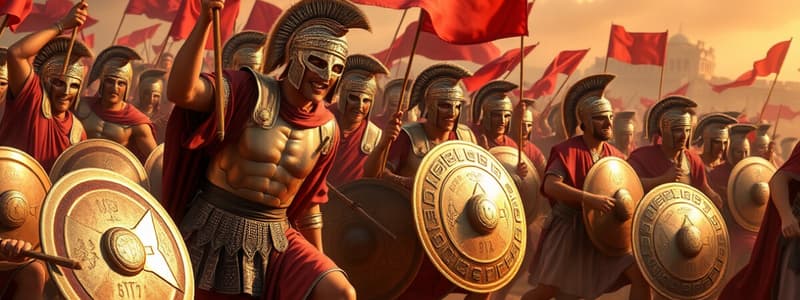Podcast
Questions and Answers
Match the following events with their consequences:
Match the following events with their consequences:
Caesar crosses the Rubicon = End of the Roman Republic Caesar declared dictator for life = Concentration of power Assassination of Caesar = Civil War breaks out Augustus becomes emperor = Birth of the Roman Empire
Match the individuals with their roles in Caesar's story:
Match the individuals with their roles in Caesar's story:
Brutus = Assassin of Caesar Pompey = Caesar's rival Octavian = Caesar's nephew and successor Cassius = Leader of the conspirators
Match the terms with their definitions:
Match the terms with their definitions:
Pax Romana = Period of peace in the Roman Empire Imperator = Title used by Caesar meaning 'emperor' 2nd Triumvirate = Alliance of Octavian, Mark Anthony, and Lepidus Civil War = Conflict between supporters of Caesar and his assassins
Match the geographical regions with their historical relevance:
Match the geographical regions with their historical relevance:
Match the consequences of Augustus's reign with their outcomes:
Match the consequences of Augustus's reign with their outcomes:
Match the following Punic Wars with their key outcomes:
Match the following Punic Wars with their key outcomes:
Match the following events with their descriptions regarding the Roman Republic's internal conflict:
Match the following events with their descriptions regarding the Roman Republic's internal conflict:
Match the following individuals with their roles in Roman history:
Match the following individuals with their roles in Roman history:
Match the following territories with their relevance to the Punic Wars:
Match the following territories with their relevance to the Punic Wars:
Match the following key terms with their meanings related to Rome's expansion:
Match the following key terms with their meanings related to Rome's expansion:
Flashcards are hidden until you start studying
Study Notes
The Punic Wars (264-146 BCE)
- A series of three wars fought between Rome and Carthage for control of the Mediterranean.
- Resulted in Rome's dominance in the region and territorial acquisition in North Africa.
Overview of the Punic Wars
- 1st Punic War: Rome defeated Carthage, gaining control of Sicily, Sardinia, and Corsica.
- 2nd Punic War: Hannibal led an invasion through Spain and the Alps but was ultimately defeated by Roman general Scipio at Zama, prompting Rome's acquisition of modern Spain and Mediterranean islands.
- 3rd Punic War: Rome's systematic attack on Carthage led to its destruction over three years, securing further North African territories.
Expansion and Internal Conflict
- Rome's territorial growth led to significant internal divisions within the government and society.
- Disagreements among officials about the size of the empire contributed to violence, as some believed in expansion while others thought it was excessive.
- Economic disparities intensified due to agricultural success in conquered regions, leaving local farmers struggle and widening the gap between the wealthy elite and commoners.
The Rise of Julius Caesar
- Born Gaius Julius Caesar in 100 BCE; gained renown as a military leader, politician, and orator.
- Elected Consul in 59 BCE and later governed Gaul, achieving notable military victories.
Caesar's Ascendancy
- Success in Gaul bolstered Caesar's popularity, political influence, and wealth, prompting concerns from rival Pompey.
- Tensions escalated when the Senate urged Caesar to relinquish power, leading to his defiance and crossing of the Rubicon River, marking a point of no return.
Transition to Dictatorship
- Caesar defeated Pompey's forces, pursued him to Egypt, and claimed victory there.
- Returned to Rome as dictator for life, signaling the end of the Republic and the start of imperial rule, adopting the title of imperator (emperor).
Assassination of Caesar
- Fears of Caesar's accumulating power culminated in a conspiracy led by senators Cassius and Brutus.
- Despite warnings, he attended the Senate where he was assassinated on March 15, 44 BCE, stabbed 35 times.
Civil War Following Caesar's Death
- Caesar's assassination incited a civil war that lasted two decades, fueled by divided loyalties among Roman factions.
- Many common citizens supported Caesar due to his land and food distribution policies.
Rise of Augustus and Establishment of the Roman Empire
- Octavian, Caesar's nephew, emerged as a pivotal figure post-assassination, forming the Second Triumvirate with Mark Antony and Lepidus.
- The Triumvirate's dissolution led to Octavian's victory at Philippi and his ascension as the first emperor, marking the birth of the Roman Empire.
Pax Romana
- Augustus initiated a period of relative peace and prosperity known as Pax Romana, which lasted approximately 200 years.
- This era was characterized by stability, continuity, and expansion across various territories.
Expansion and Cultural Integration
- Under Augustus and subsequent emperors, the Roman Empire expanded to its height in 117 CE, encompassing diverse regions from Spain to the Middle East.
- Successful exploitation of resources and trade, including silk from China, enhanced Rome's wealth.
- The Roman Empire aimed to assimilate conquered people through architecture, language, religion, and cultural practices.
Studying That Suits You
Use AI to generate personalized quizzes and flashcards to suit your learning preferences.




